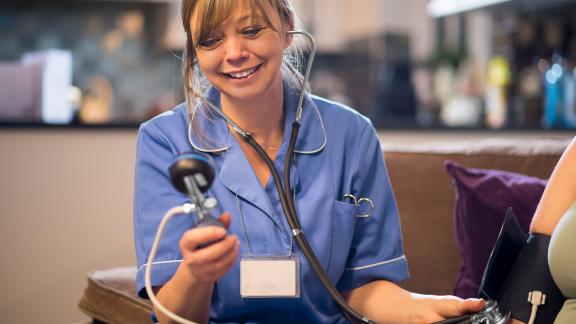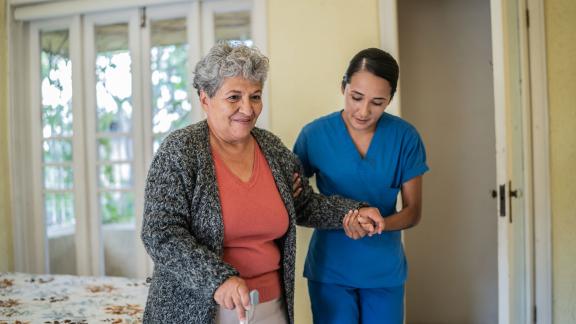Successful primary care placements for T Level students

Overview
Meon Health Practice is a partnership of GP practices in Fareham, Titchfield, Whiteley and the surrounding areas. The practice is a primary care network with a range of health professionals that is contracted to provide NHS services by the Hampshire and Isle of Wight Integrated Care Board.
Meon Health Practice identified the value and benefits that T Level students can bring to the workforce and first developed a cohesive proposal that benefits students, staff and patients to ensure successful implementation.
Key benefits and outcomes
- Mentoring students helps staff build leadership and teaching skills, while also benefiting from the students’ contributions to patient care and health promotion.
- Industry placements give students insight into healthcare roles and has led to some pursuing careers in paramedic science and health coaching.
- Students gain confidence and complete meaningful workplace projects.
- The programme supports future recruitment, with potential for students to return as employees after further training or qualification.
What the organisation faced
The wellbeing team identified the benefits of supporting T Level health students and produced a detailed proposal for the primary care network managers, GPs and the lead coach. The proposal highlighted the valuable contributions T Level students can make to the workforce during their placements.
What the organisation did
The proposal addressed potential concerns about insurance (which already covers all staff, including volunteers, students and staff under 18) and DBS checks (which are completed by the college). The primary care network managers, GPs and the lead coach agreed to the placements. Writing the proposal meant the placement was well considered and designed to be beneficial for both the students and the primary care trust team. It included an outline of the students’ role and responsibilities, recognising that T Level students have the skills to actively contribute and become valued members of different teams.
The practice offers placements to T Level health students from Havant and South Downs College who have a foundational knowledge of nursing and skills directly applicable to the surgery environment. This means that in initial client assessments, students can record measurements, such as height and weight. Under supervision, they provide basic advice, and they support behaviour changes that will maintain and improve health, such as weight management, smoking cessation, diabetes management and cardiovascular disease prevention. Working with clients in this practical way helps them improve their communication skills, which are further enhanced by assisting health professionals with clinical or therapeutic interventions and running group sessions.
Students learn about the role health and wellbeing teams play in improving local community health by working with different teams in the practice. In the dedicated wellbeing team at the practice, they learn client-centred care and they support people facing various life challenges. In the primary care trust team, students work with social prescribers and health and wellbeing coaches to promote behaviour change and physical activities. Students also work with clinical practitioner teams, including phlebotomists, doctors, nurses, the frailty team and healthcare assistants. Through this hands-on experience, T Level students see the direct impact of their work on clients’ health and wellbeing.
Results and benefits
Staff at the practice enjoy mentoring the students and appreciate the opportunity to develop their own skills. They also value the contributions the students make to helping individuals understand and take control of their own health.
“Our staff enjoy the fresh energy and talents that T Level students bring. Students and staff learn from each other, with staff particularly appreciating the opportunity to nurture new talent and develop their leadership and mentoring skills.”
Jane Majidzadeh, Wellbeing Team Manager
As part of the T Level placement, each student is required to complete objectives drawn from their studies and agreed by the student, college and placement staff. The aim is to show student learning, but it must also benefit the workplace. Projects so far have helped promote health campaigns by creating health promotion boards and posters and they have helped clients to stop smoking.
The proposal also highlighted the potential for T Level students to return as employees once they had completed their course or after further training, such as nursing or social work registration. The placements give students an insight into the roles they can apply for once they have completed their placement, and gives them confidence to apply. When available, they can apply for roles such as health coaches; managing their own caseloads and leading activities like ‘walk and talk’ and exercise classes. The T Level students who have completed placements so far have pursued healthcare professional courses, including paramedic science and nursing.
The proposal also emphasised how the approach would strengthen the existing partnership with Havant and South Downs College. Working on the placements has created a mutually beneficial relationship. The practice offers placements in a primary care network, while the college supports staff recruitment and provides additional room space when needed.
Integrating T Level placements into a primary care network brings multiple benefits. Providing hands-on experience for students not only enriches their understanding of health and social care but is an opportunity for them to make meaningful contributions to the community and inspire future career choices.
The written proposal was effective because it proactively addressed potential concerns or risks. By then working through each concern, checking the insurance coverage and working with the college on the necessary DBS checks, the proposal assured the safety of students, the practice and patients.
The practice found that the placements help their staff develop leadership and mentoring skills. They also support the development of strong partnerships that organisations and colleges can benefit equally from.
Takeaway tips
- A well-prepared proposal should cover potential challenges, address issues and be clear about the benefits for the student and the practice.
- T Level students contribute to the work of the practice. They have been taught foundational nursing skills, such as taking vital signs and recording patient information, which are directly applicable to the surgery environment.
- Placements are an opportunity to identify and nurture future employees – to build a talent pipeline.
- Collaborating with local colleges brings mutual benefits and support.
For more information about this case study, contact Jane Majidzadeh, wellbeing team manager.



